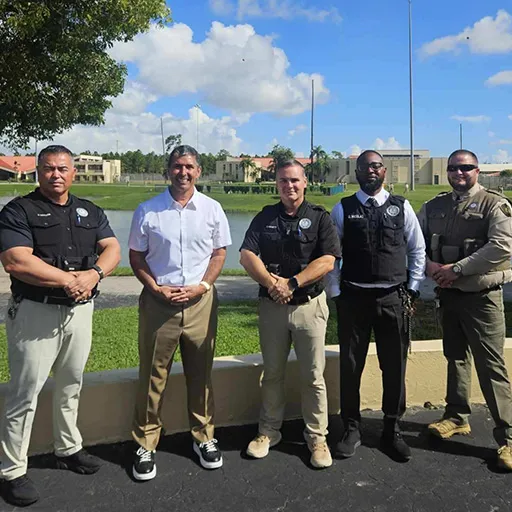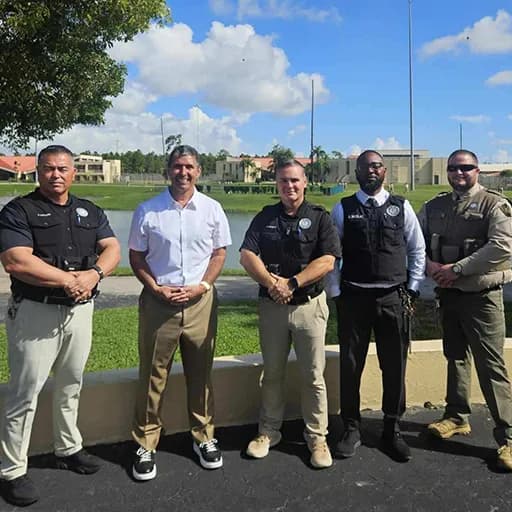
On August 11, 1987, authorities arrested me in South Florida and brought me into federal custody at the Metropolitan Correctional Center (MCC) Miami—the first of many prisons where I would serve more than 9,000 days before my transition to a halfway house on August 13, 2012.
Yesterday, on Monday, October 20, 2025, I returned to that same facility—now known as Federal Correctional Institution (FCI) Miami—to make a presentation to the people confined there. This visit was not just professional; it was deeply personal.
I am grateful to Warden Grant Huett for authorizing the visit and to Reentry Affairs Coordinator Quincy Nicolas for coordinating every detail of the day. Their hospitality and commitment to meaningful programming made this return visit possible.
Remembering the Beginning
When I first arrived at MCC Miami in 1987, I walked through those gates in handcuffs, angry, confused, and unprepared to face the consequences of my actions. I remember sitting in the chapel, praying to God for strength to carry me through the years ahead.
But at that time, I wasn’t ready to accept responsibility. I relied on my defense attorney’s strategy and clung to denial. Had I made better choices during those first days of confinement—had I embraced accountability sooner—I may not have spent multiple decades in prison.
Still, one truth has guided my life ever since: it’s never too early or too late to begin working toward better outcomes.
A Turning Point in Solitary
My time in Miami was brief. Soon after my arrest, authorities transferred me to a holding center in Seattle, where my case would proceed through the federal courts. Although my offense did not involve violence or weapons, because it carried the potential for a life sentence, jailers confined me to solitary confinement.
It was inside that small, cold cell that my transformation began.
A correctional officer named Mr. Wilson handed me a book—the autobiography of Frederick Douglass. His story of overcoming enslavement through education and discipline transformed the way I thought about my own situation.
That book, and the conversations that followed, helped me understand a timeless truth:
“By changing the way we think, we can change our lives. And when we change our lives, we can work toward changing the world.”
Returning to the Chapel
Walking into the same chapel decades later, I felt a profound sense of gratitude. More than 150 men sat waiting to hear my story. For three hours, we shared an open, honest conversation about responsibility, education, and transformation.
I told them how the journey that began in a solitary cell ultimately led to the creation of Prison Professors, a nonprofit dedicated to helping justice-impacted people prepare for success through education, self-discipline, and accountability.
Their attentiveness and questions reminded me that the human spirit remains strong, even behind prison walls. Many of them expressed a sincere desire to grow, to contribute, and to find purpose.
Building a Movement from Within
I invited every participant to join our movement—to become ambassadors of change by documenting their growth and building self-directed release plans.
At Prison Professors, we continue to advocate for new mechanisms that will allow people to earn freedom through merit. But true reform requires participation from within the system. We need people in prison to:
- Lower disciplinary infractions by modeling discipline and respect.
- Document progress through journals, book reports, and release plans.
- Live as the CEO of their own lives, taking ownership of every decision.
And I made three promises:
- We will never lie to them.
- We will never ask them to do anything I didn’t do myself.
- We will never charge people in prison—or the Bureau of Prisons—a single penny for our work.
Those commitments define how we earn trust and credibility, one presentation at a time.
Looking Ahead
Returning to Miami reminded me how far a person can travel between failure and redemption. The same place that once held me in isolation has now become a platform for education, collaboration, and hope.
Through our ongoing partnerships with leaders like Warden Huett, RAC Nicolas, and the Bureau of Prisons, we aim to expand opportunities for people to prepare for success, strengthen reentry outcomes, and restore faith in what rehabilitation can mean.
At Prison Professors, we believe every person has the power to transform adversity into purpose.
Key Takeaway:
The place where my imprisonment began has now become a symbol of possibility—a reminder that even from solitary confinement, a person can start building a better life and make a lasting difference.

